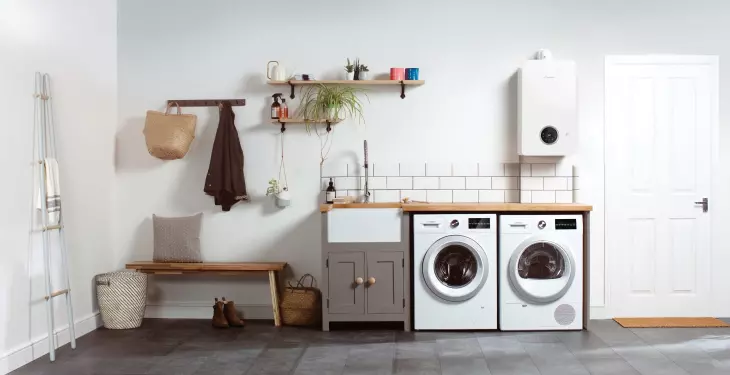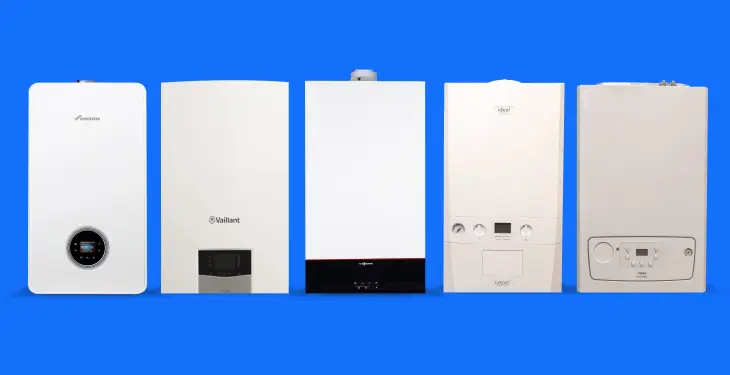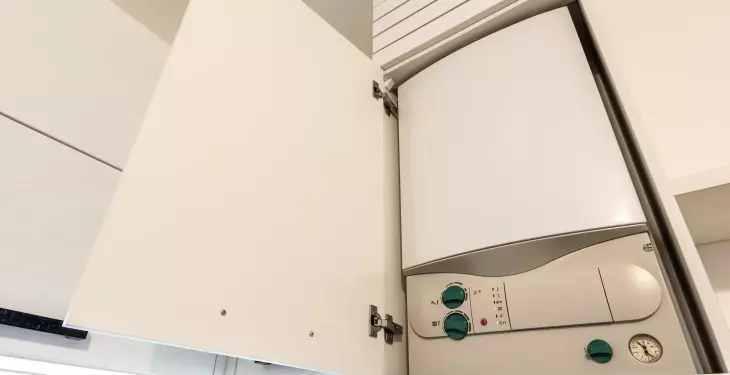

Written by Stephen Day
Gas Safe Engineer
Updated: 16th October, 2025
The UK Boiler Scrappage Scheme was a government initiative designed to promote the upgrade of ageing boilers to more efficient models.
Get a new boiler quote, save up to £550 per year (0% APR available).
The UK Boiler Scrappage Scheme was an environmental and economic initiative introduced by the British government aimed at reducing household carbon emissions by replacing old, inefficient boilers. Launched in 2009 in England, the scheme incentivised homeowners to upgrade their G-rated boilers by offering a £400 voucher towards the cost of a new, more efficient heating system.
This initiative also promised significant reductions in annual fuel bills for participating households.
Despite its success in promoting more energy-efficient home heating and contributing to the lowering of carbon footprints across the UK, the scheme was eventually discontinued.
It had effectively reached its goal, with 125,000 English households benefiting and an estimated yearly fuel bill saving of £200 to £235 for each of them. However, the scheme created a blueprint for future environmental initiatives, with subsequent programmes and alternatives being introduced, although these have varied across England, Scotland, Wales, and Northern Ireland.
Get a quote in 60 seconds, fitted as fast as next day!
0% APR finance available.
The UK Boiler Scrappage Scheme was a government initiative designed to promote the upgrade of ageing boilers to more efficient models, thereby reducing carbon emissions and aiding in energy cost savings for households.
The scheme geared towards motivating UK households towards more environmentally friendly and cost-effective heating options. Its primary purpose was to cut down carbon emissions significantly. By targeting the older G-rated boilers, the intention was to replace them with A-rated energy-efficient boilers that could push efficiency levels to at least 92%.
Key aspects of the Boiler Scrappage Scheme included the provision of financial incentives to eligible households:
A grant of £400 was available for each qualifying household.
The aim was to subsidise the installation of newer, fuel-efficient heating systems.
It targeted old, non-condensing G-rated boilers, known for their low efficiency and high carbon output.
Households adopting the scheme could expect annual savings of approximately £200 to £235 on fuel bills.
The UK Boiler Scrappage Scheme, now concluded, had specific eligibility requirements centred on household criteria and the types of boilers that qualified for the scheme. These preconditions were pivotal in ensuring the scheme benefited the intended recipients and effectively facilitated energy efficiency.
Households eligible for the Boiler Scrappage Scheme had to own a G-rated boiler, the least energy-efficient category in order to apply. The intent was to target domestic premises that would benefit most from upgrading to A-rated boilers: the most energy efficient. Local residents were often prioritised, and both landlords and tenants could apply, provided they met the specific requirements.
Eligibility included:
G-rated boilers installed in the property.
Applying households should either own the property or be landlords with tenants residing in the premises.
Connections to mains gas were typically essential.
The scheme placed a special emphasis on removing and replacing outdated G-rated boilers. To qualify, a boiler had to be:
Confirmed G-rated or equivalent, often determined by an energy supplier or professional assessment.
Not compliant with the newer, stricter A-rated efficiency standards.
The replacement systems encouraged under the scheme included both A-rated boilers and renewable heating technologies compatible with the UK government's ECO scheme (Energy Company Obligation). This facilitated a transformation towards a more sustainable and economical heating framework across thousands of households.
To summarise, strict eligibility and specific boiler type requirements were fundamental for the UK Boiler Scrappage Scheme, ensuring only suitable households and inefficient heating systems were targeted for an upgrade.
The UK Boiler Scrappage Scheme, introduced to improve the nation's energy efficiency, was discontinued due to a complex array of factors. These reasons include financial limitations and the evolving landscape of domestic energy policy.
Shift in Government Priorities: It seems that the scheme's primary objectives had been largely met, with a significant number of old, inefficient boilers replaced. The government likely decided that the funds allocated for the scheme could be more effectively used elsewhere, such as in the newer Affordable Warmth Obligation, which is part of the government's ECO scheme aimed at fighting fuel poverty.
Budgetary Constraints: Financial restrictions are always a concern in public policy. The initial scheme offered up to £400 per household, which, while successful in its uptake, placed substantial demands on public resources. These expenses may have become unsustainable given the large number of participants and other emergent fiscal pressures.
Technological Advancements: Advances in heating technology meant the scheme, primarily targeting G-rated boilers, was gradually becoming outdated. As more efficient boilers became widely available and affordable, the rationale for a scrappage scheme diminished, urging a transition towards encouraging the adoption of low-carbon and renewable alternatives.
Energy Bill Savings and Emissions: Although the scheme was effective in reducing energy bills and CO2 emissions by encouraging the installation of more efficient heating systems, such benefits had to be continually weighed against the costs of the scheme and the long-term strategy for energy efficiency and carbon emissions reduction in the UK.
In essence, the retirement of the Boiler Scrappage Scheme was influenced by its own success in enhancing energy efficiency, alongside evolving priorities that aimed to address energy and heating bills, CO2 emissions, and provide affordable warmth to households through new initiatives. As a testament to its success, many households continue to reap the benefits from reduced heating bills due to the scheme's emphasis on replacing antiquated, inefficient boilers with more modern, environmentally friendly options.
While the UK government's Boiler Scrappage Scheme has been phased out, there are several alternatives assisting households with boiler costs. These initiatives offer various forms of financial support, such as grants and rebates, ensuring energy efficiency remains a priority for homeowners.
The Energy Companies Obligation (ECO) is a programme where larger energy suppliers must help low-income households with energy efficiency measures. Homeowners may receive partial or full funding for boiler replacements, reducing both their energy bills and carbon footprint.
Local authorities have the power to set distinct eligibility criteria for energy efficiency improvements under The LA Flex Scheme. They collaborate with energy suppliers to identify qualifying households, which can include those not traditionally meeting low-income or vulnerability metrics.
The application process for these schemes can vary. Contacting the Energy Saving Trust or individual energy suppliers like British Gas typically starts the journey. Documentation proving eligibility, such as income or energy performance certificates, is generally required.
Part of the ECO scheme, the Affordable Warmth Obligation mandates suppliers to offer heating and insulation improvements. This is targeted at low-income, vulnerable households to ensure they have access to necessary warmth without exorbitant costs.
Introduced as a direct response to the discontinuation of the boiler scrappage scheme, the Boiler Upgrade Scheme (BUS) helps cover the upfront costs of cleaner heating systems. This fosters a collective effort to achieve the UK's carbon reduction targets.
In the bid to phase out inefficient G-rated boilers, the UK Boiler Scrappage Scheme supported the transition to several high-efficiency heating systems. Eligible recipients were encouraged to consider various upgrading options.
Biomass Boilers: Heating technology that utilises wood pellets, chips or logs to generate heat. Biomass boilers are considered more sustainable as they use organic materials, reducing reliance on fossil fuels.
Heat Pumps: Available as air source and ground source variants, heat pumps extract heat from the environment and raise it to a higher temperature using a refrigeration cycle. These systems are often praised for their low running costs and significant reduction in carbon footprint.
Energy-Efficient Combi Boilers: These A-rated boilers provide both hot water and heating without the need for a separate water tank. Their condensing technology captures heat that would otherwise escape through the flue, making them over 90% efficient.
Condensing Boilers: Applicable to both system and regular boiler setups, condensing boilers recover more heat from the exhaust gases than traditional boilers. This results in a higher level of efficiency and reduced heating expenses.
When considering a replacement heating system, attention should be paid to the Energy Performance Certificate and a commitment to select energy-efficient models that help to drive down both household energy bills and environmental impact.
Boilers can be a daunting purchase for many people as they’re an appliance with a lot of responsibility, providing heat for you and your family is something you want to get right. Boilers aren’t exactly a quickly disposable item either, potentially lasting you a decade.
Effectively, new boiler cost can be split into two segments: the first is the actual boiler itself (unit price), and the second is the cost of the boiler being installed (set up) in your property by an expert engineer.
Here at iHeat, we want to remove all of this undue stress and make the decision making process of upgrading to a new central heating system, as easy as possible.
Boiler costs can vary depending on a number of factors including their brand, model, fuel, output, warranty, labour and installation type. Typically a new boiler will cost between £1,845 and £3,500, below is a list of average boiler installations offered by iHeat (guide only).
Installation Type | Price (inc VAT) | |
Combi to combi swap | £1,845 | |
System to combi conversion | £2,499 | |
New boiler install | £2,899 | |
Back boiler to a combi | £3,299 | |
System to system | £1,945 |
Last updated: 16th October, 2025

Written by Stephen Day
Gas Safe Engineer at iHeat
Stephen Day is a Gas Safe registered and FGAS certified engineer with over 20 years of hands-on experience in the heating, cooling, and renewable energy industry, specialising in boiler installations, air conditioning, and heat pump systems.
LinkedInArticles by Stephen Day are reviewed by iHeat’s technical team to ensure accuracy and reliability.

19th December, 2025
The best budget boilers are Ideal, Alpha, Baxi, Worcester Bosch and Vaillant models, compa...
 Read Article
Read Article

19th December, 2025
The most reliable boiler brands in the UK: Worcester Bosch, Vaillant, Ideal, Viessmann, an...
 Read Article
Read Article

19th December, 2025
An airing cupboard is a heated storage space that uses warmth from a hot water cylinder or...
 Read Article
Read Article
No obligation. Takes less than 60 seconds.